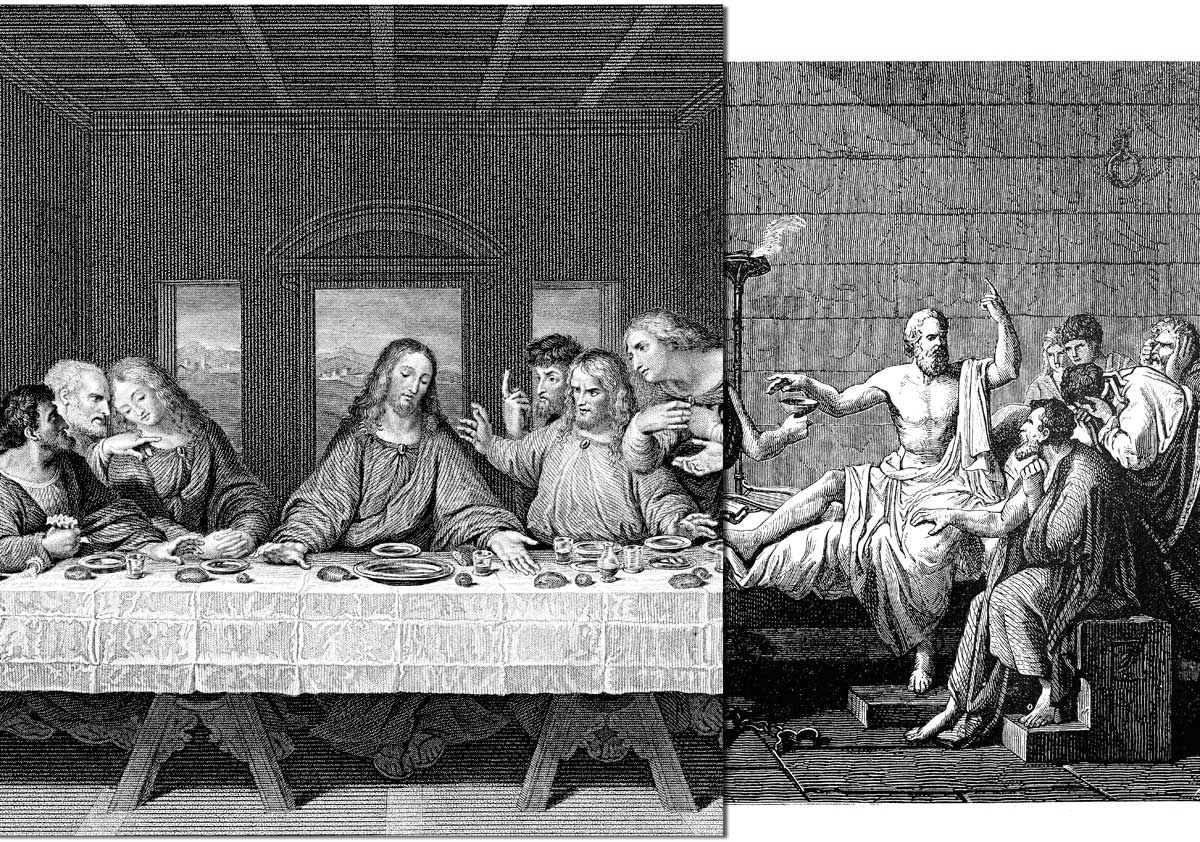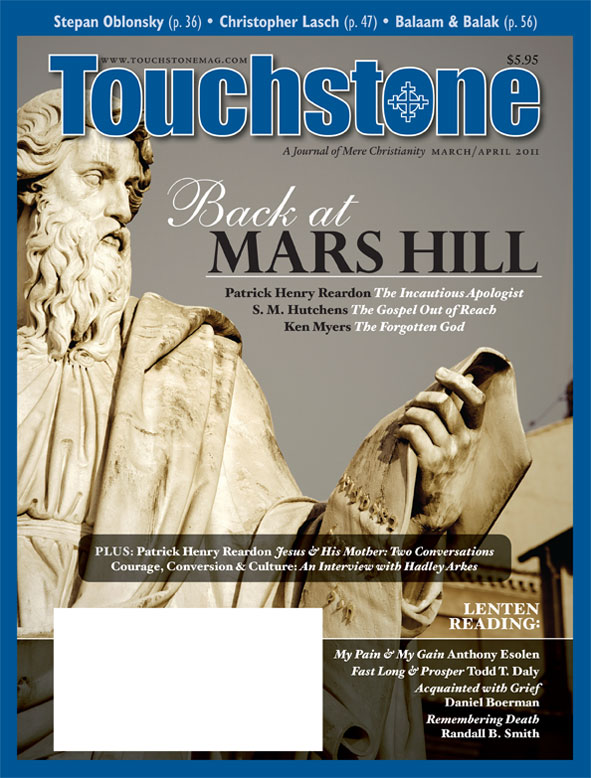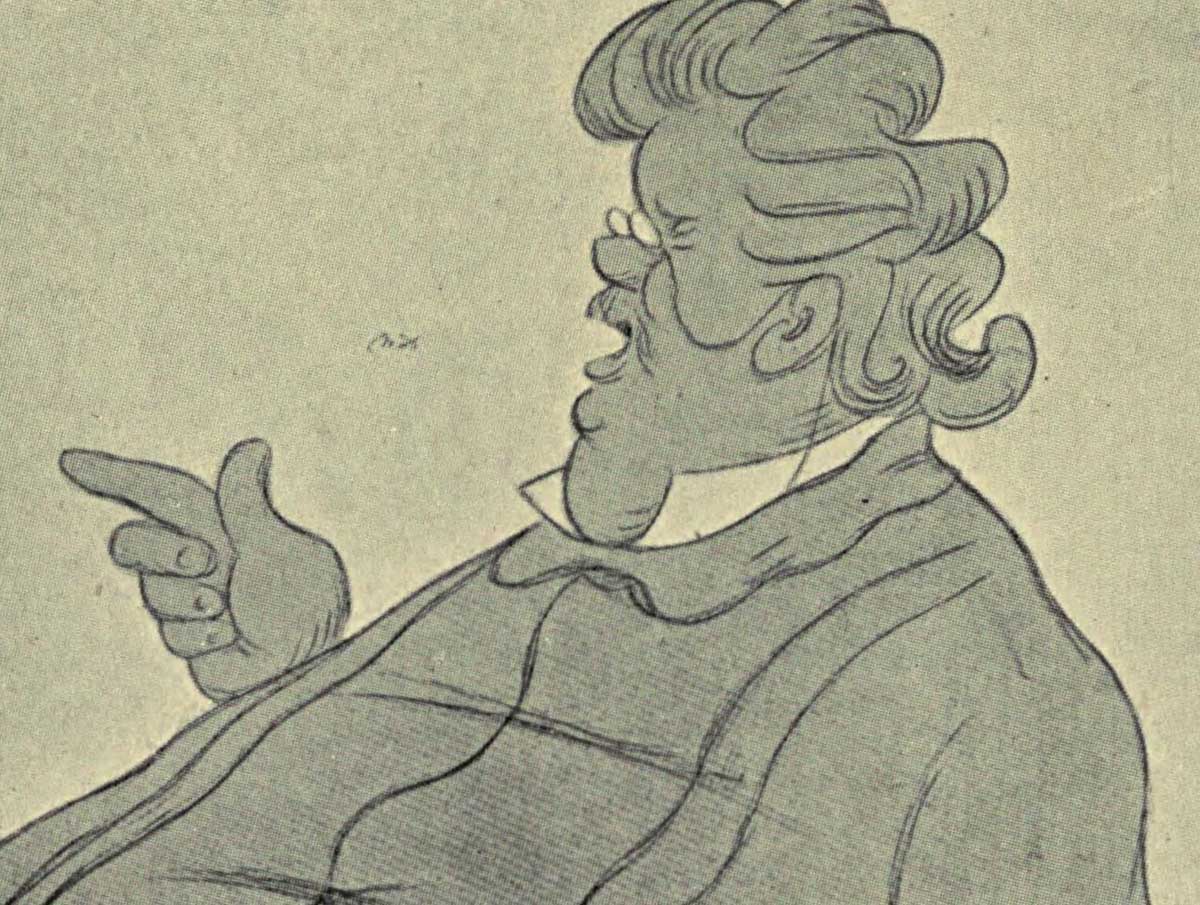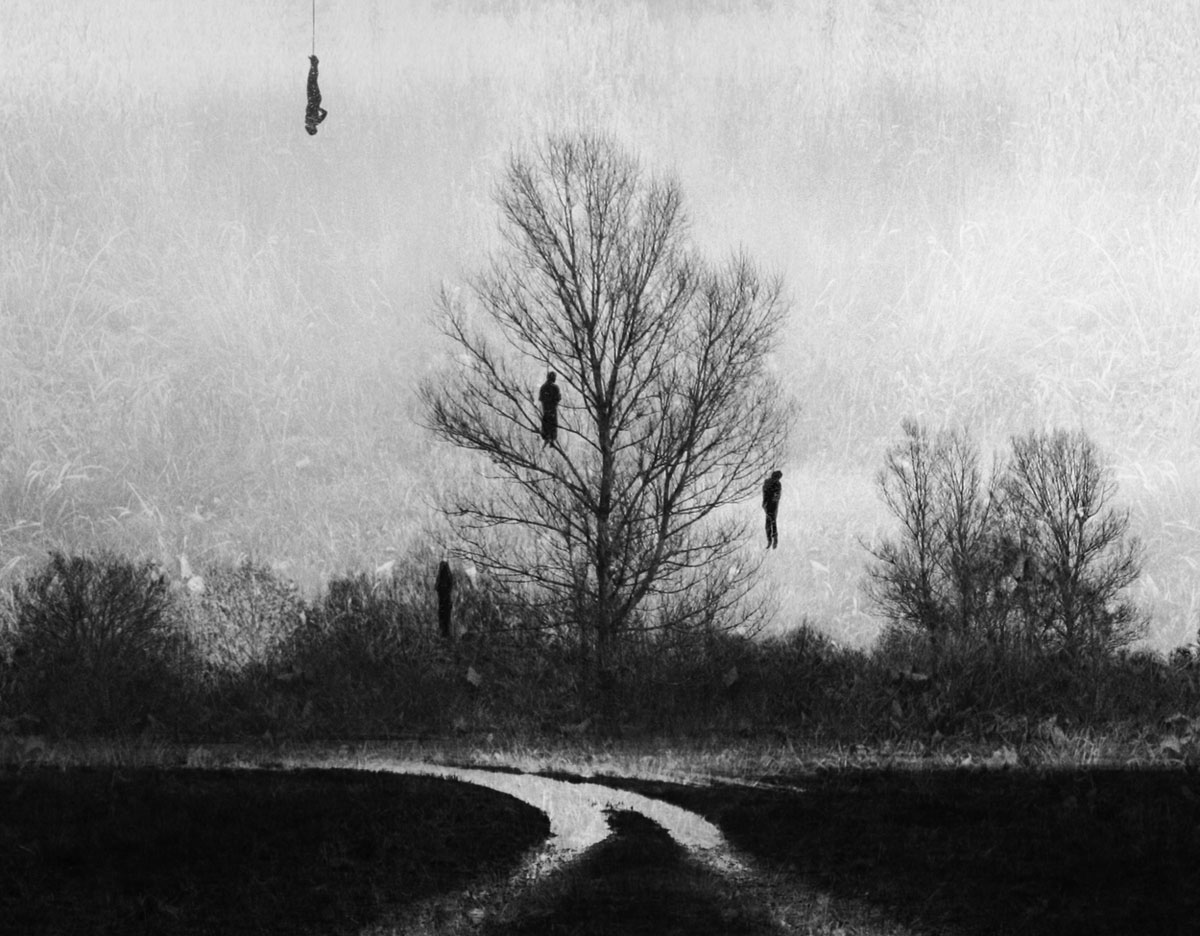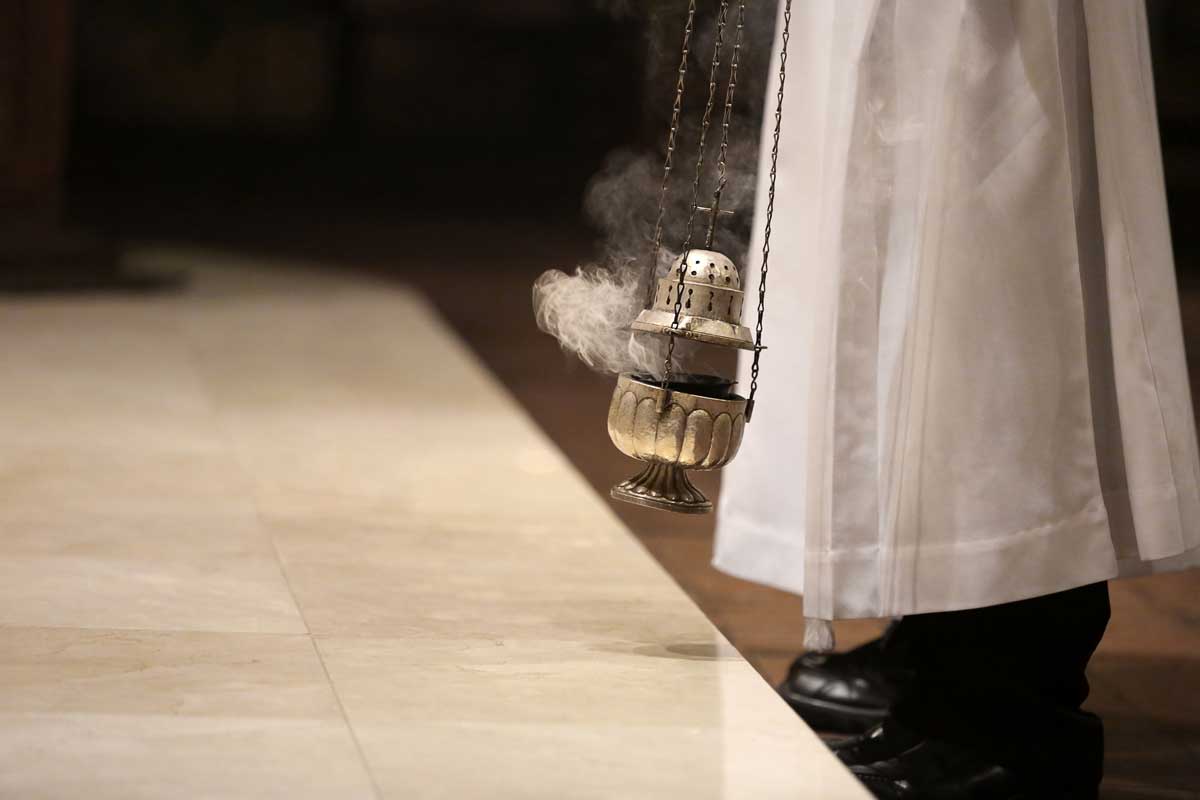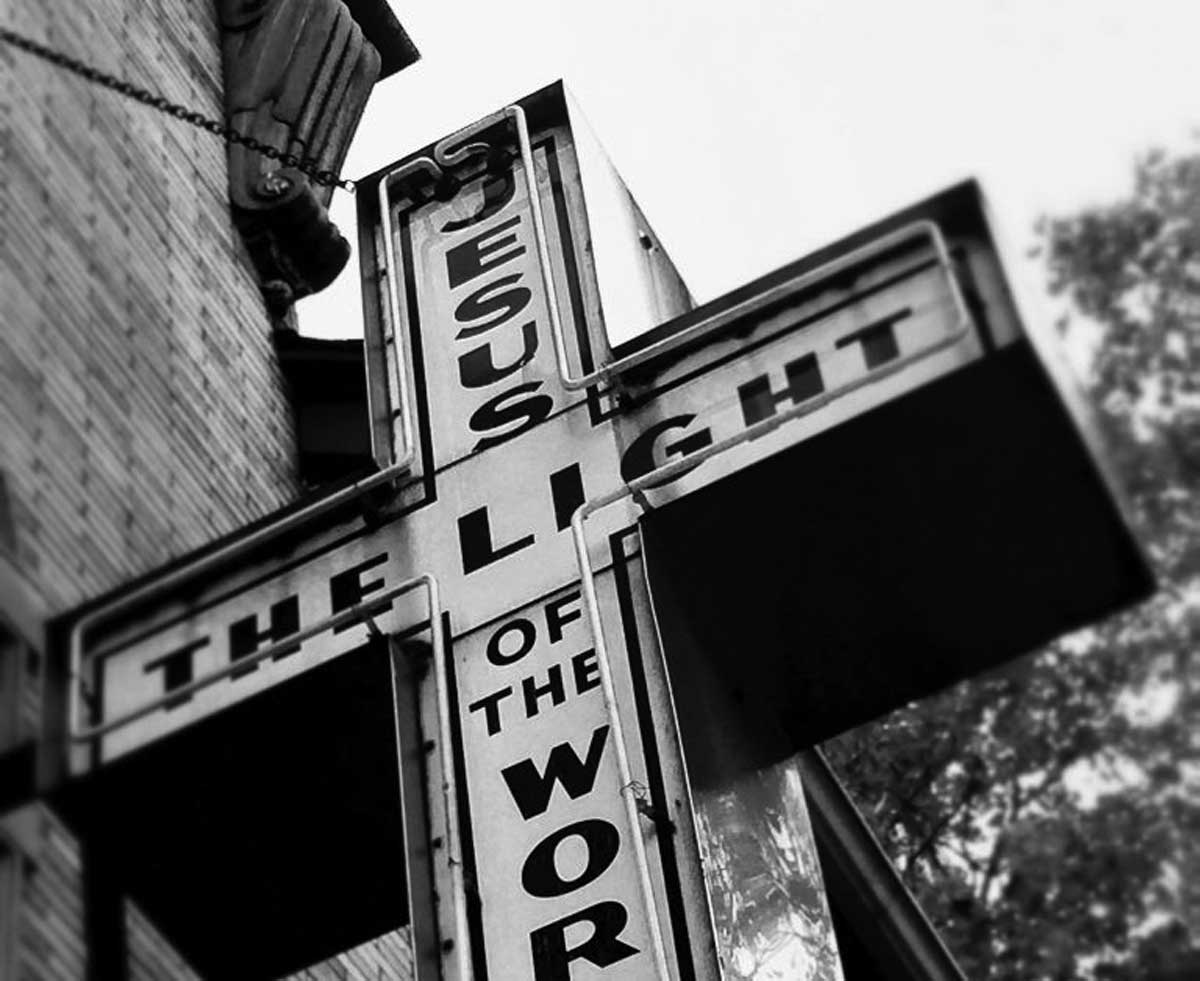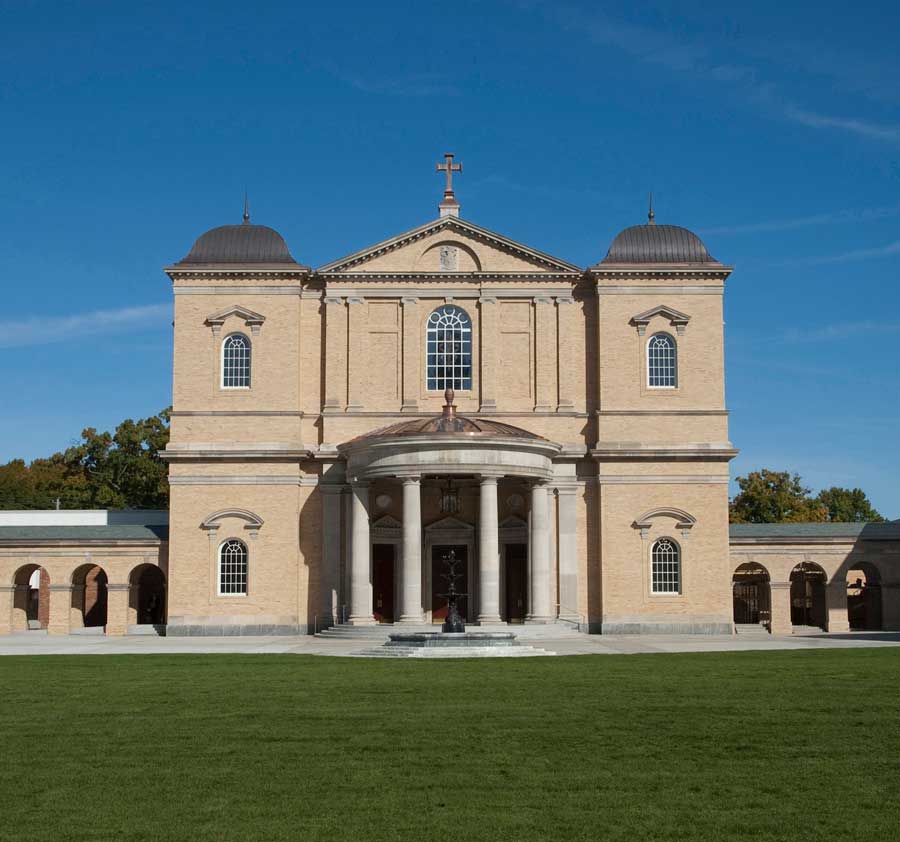Feature
Our Numbered Days
Certain Death & the Last Lectures of Socrates & Jesus
Let me say first off that the idea of a “last lecture” series—in which the speaker is expected to answer the question, “What would you say if this were the last lecture you would give in your life?”—is a good one; indeed, it has had a long and noble tradition within philosophy. Yet when I was first invited to give a “last lecture,” I demurred, for two reasons.
First, I associate such lectures with death. And although I’m getting a bit creaky in the joints, I’m not ready to pack it in just yet. But then, upon reflection, I realized that death can come to anyone at any time. So perhaps all of us—including me—ought to be ready to deliver our “last lecture” at any moment if called upon to do so.
The other, more important reason I was uncomfortable with the thought of delivering a “last lecture” is that I have always assumed that such a talk should be delivered by someone wise. And sadly, I am not. But then I realized that, although I am not especially wise, I know some people who are. So I decided that, instead of giving my own “last lecture,” I should talk about the last lectures of two particularly wise and important men: Socrates and Jesus Christ.
Two Questions to Ponder
The first of these—indeed, what we might call the “Platonic ideal” of the last lecture—was given by the Greek philosopher Socrates after he had been arrested and tried on charges of corrupting the youth of Athens and encouraging disrespect toward the gods of the city. Though he mounted a spirited defense of himself, it was not entirely effective; indeed, it got him the death penalty. But before his execution, he engaged in a last lecture of sorts with his students, and it constitutes the basis of one of Plato’s dialogues called the Phaedo.
In the Phaedo, we are told that Socrates spent his last hours doing what he had always done during his day-to-day life—namely, talking with his friends and fellow citizens about some of the fundamental questions of human life: What is truth? What is the nature of the human person? What makes us happy and what is a good life for man? What about death?
It is interesting to think of a man who chooses to spend the last hours of his life doing what he had always done. It suggests a man who has truly found his vocation. It also suggests two sorts of questions well worth asking—and not just when you get old or are facing death.
The first is: Would you spend the last days and hours of your life doing what you do every day? If not, why not? What would you do instead, and why aren’t you doing that sort of thing right now? If your answer is: “I’m preparing myself to do what I really want to do,” then ask yourself whether there is really any connection between the things you are doing now and the things you would be doing if this were your last day on earth. Have you, like Socrates, found your vocation?
The second question focuses more squarely on “the hour of our death”: What would you do with your time if you were told you had two years left to live? Or two months? Or two days? What sort of “preparing” would you do then? It’s one thing to think about how we might live more fully now; it’s quite another to consider whether the things we do now might have ramifications after we’re dead.
Either way, there certainly seems to be something about the prospect of death that, as Dr. Johnson once said about hanging, “concentrates the mind wonderfully”—usually on the things that are most important in life. Indeed, the tragedy seems to be that many people fail to think about what is truly important in life until they are on their deathbeds, and then it is too late. “If only we could have had that clear vision of things sooner!” people will sometimes say.
A Tranquilized State
Perhaps we can—but only if we spend time listening to people who are facing (or who have faced) death. We certainly won’t if we constantly avoid the subject, if we live in the state the philosopher Martin Heidegger once described as “the constant tranquilization about death.” “Yes,” we say to ourselves, “some day we will die,” but in the meantime, death remains for most of us in the “undetermined, and thus easily ignored future.”
It might be worth considering the kinds of things that tranquilize us to the lessons of death, or that bring about what Edward Young describes in his poem “Night Thoughts” as the “forgetfulness of death.”
Time on this head has snow’d, yet still ’tis borne
Aloft, nor thinks but on another’s grave. . . .
Father of all, forgetfulness of Death!
As if, like objects pressing on the sight,
Death had advanc’d too near us to be seen. . . .
We stand, as in a battle, throngs on throngs
Around us falling; wounded oft ourselves;
Tho’ bleeding with our wounds, immortal still!
We see time’s furrows on another’s brow,
And death intrench’d, preparing his assault:
How few themselves, in that just mirror, see!
Or, seeing, draw their inference as strong!
There death is certain; doubtful here: he must,
And soon, we may, within an age, expire.
Tho’ gray our heads, our thoughts and aims are green;
Like damag’d clocks, whose hand and bell dissent;
Folly sings six, while nature points at twelve.
Why is it that we do not hear the clock upon the wall? What blinds us from entertaining the pointed thought of death, even in the face of its inevitability?
Evasion versus Honesty
Good question. And one worth thinking about not just when you’re on your deathbed. But can we really learn any of the lessons that facing death teaches before we’re on our deathbed? Perhaps, like Socrates, we should be preparing our “last lecture” every day, precisely with the way we live our lives. But facing up to the question of death is, like all other forms of self-honesty, not easy, especially in America, where old age is something that happens to other people, and death is . . . well, let’s just say that, like religion, it’s a subject best left un-talked about.
Indeed, for the civilized, postmodern man of the therapeutic age, if thoughts about such things should ever arise, it is generally considered best to dismiss them quickly, lest one become morbid or, worse yet, devout, which is often thought to amount to much the same thing. Both are considered life-denying.
True story: I once had a student, a wonderful, bright, young Catholic woman from a good southern family, whose best friend was considering entering a religious order. Oddly (I thought), this news about her friend made my student very sad.
“Why?” I asked.
“Because she won’t want to go shopping with me at the mall anymore; she’ll be distant.”
“But it’s not as though she’ll be dead,” I said, trying to reassure her.
“Actually, that might be easier to deal with,” she replied.
“Really? Why?” I asked.
“Well, then I could just live with the memory of her—as she used to be—without her actually being around and being, well, you know, different.”
“Would you really rather she were dead?” I asked.
“No, of course not.” She sighed. “I’d just rather not have to deal with either one.”
It’s interesting to think about a culture in which failing to enjoy shopping is considered a kind of death. (But then again, perhaps it is: a death to self—the kind of death that makes possible a new sort of life.) Those who enter the religious life are sometimes criticized for trying to “escape” from their responsibilities in the world—even for “escaping from reality.” Somewhat fewer people in our culture are disposed to see constant shopping for things one really doesn’t need as an attempt to “escape from reality.”
And yet, one wonders whether constant shopping might be one of those “evasion techniques” of which Heidegger warned us—one of the things designed to keep us in a constant state of “tranquilization about death.” What does it mean to live in the “real world”? Shopping as though the future will never come? Or living each day as though it might be one’s last? As they say: “Time will tell where wisdom lies.”
Something Beyond
Socrates had the wisdom to understand that a life lived ignoring the reality of death is a life lived in illusion. And a life lived in illusion, he thought, would be immeasurably poorer than one lived in full view of the truth of things. “The unexamined life is not worth living,” he declared at his trial. And “the examined life,” if it meant nothing else, meant facing squarely the unavoidable fact of one’s own mortality and eventual death. “Know thyself” was an admonition the Greeks had learned from the oracle at Delphi. And Socrates understood that one cannot know himself truly without knowing himself to be on a journey toward something beyond this life.
Thus, while many of us might avoid the subject of death in the last hours of our lives, Socrates spent his last hours giving his students his “last lecture” about death and why the true lover of wisdom should not fear it. Death, he said, was merely the separation of the soul from the body, and although the body will die, the soul will not. Thus, we should spend our lives putting aside the needs of the body and preparing our soul for its eternal destination. For Socrates, that preparation of the soul involved education and the increase of knowledge, as well as a life devoted to virtue:
Thus let a man be of good cheer about his soul, who has cast away the pleasures and ornaments of the body as alien to him, and rather hurtful in their effects, and has followed after the pleasures of knowledge in this life; who has adorned the soul in her own proper jewels, which are temperance, and justice, and courage, and nobility, and truth—in these arrayed she is ready to go on her journey to the world below, when her time comes.
Now, as a Christian who holds dear his belief in the “resurrection of the body,” I cannot agree with Socrates’ notion about the relationship between the soul and the body. Yet there is still undoubtedly great wisdom in his words: in his teaching, for example, that one ought to nurture the soul as well as the body, and that one’s life ought to involve, in some sense, a preparation for death, or perhaps better yet, for the life after death.
Socrates’ “last lecture” also suggests the truth of something Pope John Paul II affirms in his encyclical Fides et Ratio, namely, that the answers people give to the fundamental questions of meaning will often decide the direction they seek to give to their lives. The direction Socrates gave to his life was founded on his answer to the fundamental question: What is there after this life? He had the wisdom to see that the changing world around him—what T. S. Eliot describes in The Wasteland as “the world of gulls and deep sea swells and profit and loss”—was not the only, or even the ultimate, reality. Indeed, this world, he believed, had to be judged in view of a higher, more ultimate reality.
No Escape
The classic criticism of people who spend much time thinking about the afterlife or a “higher, more ultimate reality” is that they will forget their obligations and responsibilities to take care of life in this world. Marx, for one, thought that Christianity’s embrace of an afterlife made the faith an “opiate of the masses”: it caused people to look for justice in a world beyond this one, rather than fight for it now, in this world. And Freud thought that the deep yearning men have to avoid the reality of death is one of the reasons they “create” notions like God, heaven, and the afterlife in the first place; these things serve as a kind of existential “escape from reality” for them.
And yet, oddly enough, “escape” was the one thing Socrates didn’t seem anxious for. Nor was justice in the polis something about which he was unconcerned. In an earlier episode, recounted in Plato’s dialogue Crito, Socrates’ devoted student Crito had gone to the great philosopher in prison to try to convince him to flee Athens. Crito had bribed the jailer (“I have done him a kindness”), who was willing to look the other way (as perhaps also were the Athenian authorities) while Socrates escaped into exile. Socrates refused, showing Crito that “not life, but a good life is chiefly to be valued.”
Thus, contrary to the expectations of critics like Marx, Socrates’ faith in the next life did not cause him to be less solicitous of his duties in this one. He was confident that his acts of justice and courage in this life would have a value extending beyond its earthly limitations, and it seems clear that this confidence is what made it possible for him to stand firm in his service to the city, even in the face of execution by its authorities.
Indeed, when the time for Socrates’ execution had come, says Plato, he called for the poison to be brought quickly. Then, “after making a prayer to the gods that they might prosper his journey from this world to the next,” Socrates brought the cup to his lips and “quite readily and cheerfully” drank the poison. And then he lay on his back, while the paralysis from the poison crept from his legs upwards, progressively killing off each part of his body until he was unable to move anything but his lips.
He had become, in effect, a talking head, a mind speaking. The body had failed, but the words continued. And at the end, Plato tells us, Socrates drew the veil from his face and spoke his last words: “Crito, I owe a cock to Asclepius; will you remember to pay the debt?” Asclepius was the god of physicians. Saying he owed a cock to Asclepius was his way of saying he was being healed. And with that, he was dead.
A Lived Lecture
And that, to my mind, was a great last lecture. Why? Because there was in this speech a profound integrity between word and deed, between the truth of things and the truth that characterized the life of the speaker. Socrates lived out in practice, to the very end, the moral principles he taught.
If we understand the purpose of speech not only as the communication of thoughts about things, but also as a self-communication of oneself to another, then the best and most honest sort of speech is that in which what is being communicated is authentic and true: true about the world and true about the speaker’s relationship to the world. When a man cheats on his wife and tells her that he has been faithful, he has been untrue to her in two ways: his words do not correspond to the objective reality of the world (he wasn’t really working late at the office), and they do not communicate the truth about the speaker (he is not really a faithful husband). And thus his existence becomes a lie.
Socrates taught—he spoke in words—that “it is better to suffer evil than to do evil,” that care for the soul was more important than care for the body, and that one who has lived a life dedicated to justice, courage, nobility, and truth should not fear death. And having taught by speaking, Socrates embodied the truth that he spoke, even in the face of death. That is one thing that makes his last hours a great “last lecture.”
Another is that, during that lecture, when his execution was literally only minutes away, Socrates, great teacher that he was, even took questions from the class! At a certain point in the dialogue, two of his students, Simmias and Cebes, raised objections to some of his arguments. Talk about cheek! A man is facing impending death, and these two kids want to disagree with him! Teachers everywhere have experienced the challenge of dealing with students who procrastinate, but Simmias and Cebes may have set some sort of record—still trying to get their questions answered two minutes before their teacher’s death (a record that could only be surpassed by a Teacher whose Spirit could still answer questions even after his death).
But often, it is not the answers a teacher gives, but the questions he asks, that are most important. So when the time for his execution was finally at hand, Socrates turned to his two young companions and said to them: “And you, Simmias and Cebes, you as with all other men, will depart at some time or other as well,” as if to remind his hopeful and eager but procrastinating young pupils: “I die today, but I am prepared. Your time will come. Are you?”
Does Anything Last?
But the thought of one’s last days will almost certainly cause us to wonder whether anything lasts—whether anything survives death. Plato and Socrates thought that what survives death is the soul. Just as the eternal form of the Triangle or the Square continues to exist even after this particular triangular object or that particular square object ceases to be, so also, they thought, there is an eternal form of Me that will continue to exist even after this particular physical manifestation of Me has ceased to exist.
And yet, troubling questions remain for such a view. If all particular triangles are embodiments of some eternal Triangle, does that mean all individual human beings are merely embodiments of one eternal Human Being? And just as there can be multiple instantiations of the one, eternal Triangle, can there be multiple instantiations of Me? Plato, for example, seems to have believed in what we today call reincarnation. But if he was right, and there have been multiple instantiations of Me before, and will be multiple instantiations of Me in generations to come, of what importance are the experiences of my life now?
Critical to Plato’s view of reincarnation—as to any view of it—is the insistence that, after every lifetime, one’s soul must journey over the river Lethe in order to forget everything it learned in that life. The reason for this is obvious: None of us naturally remembers anything about any of our previous lives in the way we remember things about our own childhood.
But why this odd break in the chain? Wouldn’t it make more sense for me (or Me) to remember my prior-life experiences precisely so that I could learn from them and apply what I’ve learned to my current and subsequent lives? If someone said, “I used to be Socrates in a previous life,” the natural question would be, “Really? Then why are you so foolish now? What happened?”
The Limits of Pagan Wisdom
But perhaps, as in Hinduism, the goal of reincarnation is not to continue the cycle of incarnations but, instead, to escape from them. There is, however, one big problem with all views of death as “escape” from human life: they tend to render this life meaningless. Why all the grief and suffering, why all this Sturm und Drang, if the goal is simply to get past all this and on to the next world? Why not just cut short this life and get there? As the poet Robert Frost says: “Die early and avoid the fate”—the fate of old age, destitution, and decay.
It’s a strange thing about notions of the afterlife: it seems that we need some notion of it, or else this life will seem meaningless. But then, we can’t rely on a notion of the afterlife that itself ends up rendering this life meaningless. If there is no afterlife, what is the point of this life? But if the afterlife is so great, why are we forced to waste time in this life at all?
And with this, perhaps, we are forced to admit that we have reached the limits of the classical pagan worldview. For all their wisdom, none of the ancient philosophers had the resources to face squarely the problem of death. Death, all agreed, was clearly something we should be attentive to, but we don’t yet have a way of thinking about it that doesn’t end up negating the value and importance of this life. For that, we must turn to another sort of wisdom and another “last lecture”—indeed, to my mind, the greatest such ever given.
A Communal Meal
That “last lecture” was delivered by Jesus of Nazareth who, “on the night he was betrayed,” gathered his closest students around him and delivered his lecture in the form of a communal meal. You’ll recall that Socrates’ last lecture was in an important way merely a continuation of what Socrates had done every day among his students. He taught them up to the very end. And an important part of that teaching had to do with what Socrates was doing. He was showing, not merely by his words but also by his actions, that a person need not fear death if he has cared properly for his soul. How Socrates faced death spoke as loudly as anything that he had said.
So, too, with Jesus; his last lecture was in an important way a continuation of what he had been teaching every day up until that time. “Having loved his own which were in the world, he loved them to the end.” And in Jesus’ life, as in Socrates’, not only what he said but also what he did was significant.
The communal meal at which Jesus delivered his “last lecture” was served on the eve of the Passover, the Jewish feast that commemorated the people’s covenant with God. Jesus is said to have taken the bread of that meal, broken it, and said to his students: “Take this, all of you, and eat it. This is my body, which will be given up for you.” And after the meal, he took the cup of wine, blessed it, and said, “Take this, all of you, and drink it. This is the cup of my blood, the blood of the new and everlasting covenant. Do this in remembrance of me.”
As you’ll recall, Socrates’ last lecture took place at a communal gathering too, but for good reasons, only Socrates drank the wine. There was wine at Jesus’ last meal, but everyone got to drink from the same cup. In fact, those who wish to can drink from that cup to this very day—if they are willing to accept its contents.
Why am I calling this communal meal a kind of last lecture? Because this was not a common meal, plain and simple, as wonderful as such things may be. This was a lesson. It was, in fact, the last and most important lesson about something Jesus had been trying to drum into the heads of his students repeatedly throughout his ministry, using all the various means at his disposal: by his preaching and teaching, in the way he treated others, through the kinds of miracles he did, the kind of life he lived, and, above all, the way he died.
The central message had to do with something called “the Kingdom of God.” And by means of this meal and the events that followed, Jesus was imparting to his students their last and most important lesson about the true nature of that kingdom.
The True Nature of the Kingdom
There is a common set of misconceptions to which human beings seem prone when they hear a term such as “the Kingdom of God.” The most basic of these misconceptions involves the not entirely unreasonable assumption that the Kingdom of God, like other kingdoms, is to be established by conquest and force. And since it is to be the Kingdom of God, victory in battle is assured.
When I used to live in Dallas, the people there often called their football team, the Dallas Cowboys, “God’s team.” Of course, I did not suppose they meant by this that their team was going to get crucified every Sunday. No, it was pretty clear that they thought being God’s team meant that God would bring them victories, victories, and more victories.
Because we are faithful to our god and offer sacrifices to him, he will favor us in battle. And we will subdue those who oppose us, because they, in opposing us, by extension oppose him. Or so goes the reasoning.
Now, although this may not be an entirely unreasonable way to understand a term like “the Kingdom of God,” this is not what Jesus understood by the term. Indeed, as far as we can tell, he spent nearly every day of his public ministry trying to disavow his students of this unfortunate misconception: namely, that the Kingdom of God was going to be established, as other kingdoms were, through conquest and power. Rather, it was to be established, as he both taught and showed them, through selfless love and sacrifice.
In fact, the blessings of this kingdom were to come, not (as with Zeus or Hera or Apollo) because of our sacrifices to the gods, but because of God’s sacrifice for us. This was the reason why only this man, Jesus, who was not only fully human, but also fully divine, could deliver this message.
Both Funeral & Wedding
Like Socrates, Jesus taught his students to pay special attention to their souls by living a moral life, a life dedicated to truth and justice. Yet that was not enough. Unlike Socrates, Jesus did not teach his students that their salvation lay in an escape from time and history and from the body. Instead, he talked about the resurrection of the body and life everlasting.
By doing so, he taught them that their bodies—and by extension their lives, their hopes, their experiences, and above all, their connections to the ones they loved in this world—would not be lost or obliterated. Rather, those things—the material stuff of this life—would be transformed and glorified in union with him, who is the source of all that is. His students began to talk about “the communion of saints”: a real and continuing presence of the dead in our lives today and into the future.
Thus, as it turned out, this Man’s funeral was also a wedding: the wedding feast of the Lamb. In this wedding, God marries his people. And we are all invited to take part in this wedding, so that we, in Christ, can share in the divine nature and take part in the great communion of love that exists between the Father, Son, and Holy Spirit. This was an amazing last lecture: delivered in person, given with the Lord’s own body. And last lectures from then on would never be the same because of it.
Our Own Last Lectures
But each of us must still decide what sort of last lecture we will deliver. Death comes for us all, in time. When it does, and we look back on our lives, what will we see ourselves to have made of them? What will our last lecture be?
And when will we start writing it? Because, whether we realize it or not, we are writing the text of that “last lecture” every single day. May God’s own Word help us to write wisely and well. •
This article is adapted from a lecture given as part of the "Last Lecture" series initiated by the students at the university. It was revised for publication while Prof. Smith was a Fellow at the Jacques Maritain Center at the University of Notre Dame, to whose staff he is profoundly grateful for their invaluable scholarly support.
Randall B. Smith is Associate Professor of Theology at the University of St. Thomas in Houston, Texas.
subscription options
Order
Print/Online Subscription

Get six issues (one year) of Touchstone PLUS full online access including pdf downloads for only $39.95. That's only $3.34 per month!
Order
Online Only
Subscription

Get a one-year full-access subscription to the Touchstone online archives for only $19.95. That's only $1.66 per month!
bulk subscriptions
Order Touchstone subscriptions in bulk and save $10 per sub! Each subscription includes 6 issues of Touchstone plus full online access to touchstonemag.com—including archives, videos, and pdf downloads of recent issues for only $29.95 each! Great for churches or study groups.
Transactions will be processed on a secure server.
more on philosophy from the online archives
more from the online archives
calling all readers
Please Donate
"There are magazines worth reading but few worth saving . . . Touchstone is just such a magazine."
—Alice von Hildebrand
"Here we do not concede one square millimeter of territory to falsehood, folly, contemporary sentimentality, or fashion. We speak the truth, and let God be our judge. . . . Touchstone is the one committedly Christian conservative journal."
—Anthony Esolen, Touchstone senior editor





